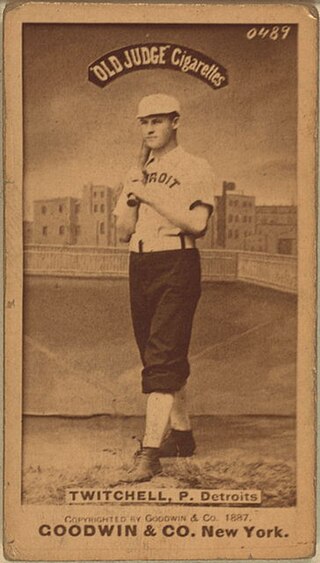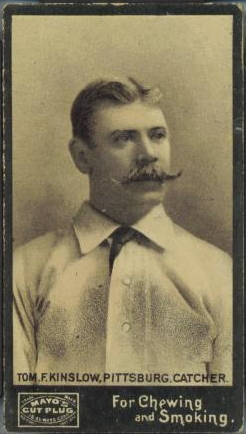The American Association of Base Ball Clubs (AA) was a professional baseball league that existed for 10 seasons from 1882 to 1891. Together with the National League (NL), founded in 1876, the AA participated in an early version of the World Series seven times versus the champion of the NL in an interleague championship playoff tournament. At the end of its run, several AA franchises joined the NL. After 1891, the NL existed alone, with each season's champions being awarded the Temple Cup (1894–1897).
The Baltimore Orioles were a 19th-century professional baseball team that competed from 1882 to 1899, first in the American Association and later in the National League. This early Orioles franchise, which featured six players and a manager who were later inducted to the National Baseball Hall of Fame, finished in first place for three consecutive seasons (1894–1896) and won the Temple Cup national championship series in 1896 and 1897.

Frederick C. "Sure Shot" Dunlap was a second baseman and manager in Major League Baseball from 1880 to 1891. He was the highest paid player in Major League Baseball from 1884 to 1889. He has also been rated by some contemporary and modern sources as the greatest overall second baseman of the 19th century. He earned the nickname "Sure Shot" for the strength and accuracy of his throws to first base, and was also sometimes referred to in the 1880s as the "King of Second Basemen."

John H. Gaffney, nicknamed the "King of Umpires" and "Honest John" was an American umpire and manager in Major League Baseball. He was baseball's first great umpire, and played a pioneering role in the use of multiple umpires in baseball games.

Thomas Tarlton Brown was an Anglo-American center fielder in Major League Baseball. Born in Liverpool, Lancashire, England, son of William Henry Tarlton Brown and Mary Nixon Lewis, he played for 17 seasons, a career in which he batted .265 while scoring 1,524 runs with 1,958 hits. Upon his retirement he served as an umpire, working mostly in the National League in 1898 and 1901–1902.

William Smith O'Brien was an American Major League Baseball player who played first base. He was considered a "one-year wonder" and led the National League (NL) in home runs in 1887.

Charles N. "Pop" Snyder was an American catcher, manager, and umpire in Major League Baseball.

Lawrence Grant Twitchell was an American professional baseball player from 1886 to 1896. He played nine seasons in Major League Baseball, primarily as an outfielder but occasionally as a pitcher, with seven different major league clubs. His best seasons were spent with the Detroit Wolverines from 1886 to 1888, the Cleveland Spiders in 1889, and the Louisville Colonels from 1893 to 1894.

William Michael Joyce was an American professional baseball player and manager. He was a third baseman over parts of eight seasons with the Brooklyn Ward's Wonders, Boston Reds, Brooklyn Grooms, Washington Senators, and New York Giants. He also served as manager during his tenure with the Giants.

James G. Fogarty was an American professional baseball outfielder.

Thomas F. Kinslow was a professional baseball player who played catcher in Major League Baseball (MLB) from 1886 until 1898. He played for eight teams in his ten-season career. Four of those seasons were with Brooklyn Bridegrooms of the National League (NL). During his playing days, his height was listed at 5-foot-10-inch (1.78 m), his weight as 160-pound (73 kg), he batted and threw right-handed, and had blonde hair.

Edward M. Daily was an American Major League Baseball player. He played seven seasons in the majors, from 1885 until 1891, for the Philadelphia Phillies, Washington Nationals, Columbus Solons, Brooklyn Gladiators, New York Giants, Louisville Colonels, and Washington Statesmen.

George Washington Keefe was an American professional baseball left-handed starting pitcher. He played in Major League Baseball (MLB) for the Washington Nationals, Buffalo Bisons, and Washington Statesmen from 1886 to 1891.

Ebenezer Ambrose "Ed" Beatin was an American baseball player. He played five seasons in Major League Baseball as a left-handed pitcher for the Detroit Wolverines from 1887 to 1888 and the Cleveland Spiders from 1889 to 1891. A 20-game winner in both 1889 and 1890, Beatin was known for having the best "slow ball" in the game. He was also a member of the 1887 Detroit Wolverines team that won the National League pennant.

James Henry Manning was an American professional baseball player, manager, executive and team owner. He played five seasons in Major League Baseball, primarily as an outfielder, but also as a second baseman, shortstop, and third baseman. He played four years in the National League with the Boston Beaneaters (1884–85) and the Detroit Wolverines (1885–87). He also played professional baseball in Kansas City, Missouri, primarily as a second baseman, from 1887 to 1892 and 1894 to 1897, including one year in the American Association with the Kansas City Cowboys.

Samuel W. Trott was an American professional baseball player and manager whose career spanned from 1877 to 1891. He played eight seasons in Major League Baseball, principally as a catcher, for the Boston Red Caps (1880), Detroit Wolverines (1881–83), and Baltimore Orioles. Trott also served as the manager the Washington Statesmen for their inaugural season in 1891.

Owen F. "Spider" Clark was an American professional baseball player. He played two seasons in Major League Baseball (MLB): 1889 for the Washington Nationals of the National League and 1890 for the Buffalo Bisons of the Players' League. While he was primarily an outfielder, he played every position at least once, including one game as a pitcher for the Bisons. He was the first MLB player nicknamed "Spider."
The St. Louis Cardinals, a professional baseball franchise based in St. Louis, Missouri, compete in the National League (NL) of Major League Baseball (MLB). As the game of baseball garnered interest in the United States in the 19th century, professional baseball in St. Louis became rooted chiefly in one disestablished Major League club – named the Brown Stockings, the same as the Cardinals' earliest name – which is loosely connected, but does not fall within the scope of, today's Cardinals. The Brown Stockings became St. Louis' first fully professional baseball club when they gained accession in the National Association (NA) in 1875. However, the NA folded after that season. That winter, with five other former NA teams, St. Louis established a new, eight-team league called the National League (NL) and began play the next season. Despite early success, Brown Stocking players were found to be connected to game fixing scandals, which forced bankruptcy and the club's expulsion from the NL. This scandal also abrogated their professional status but some members maintained play as a semi-professional team, primarily operated by outfielder Ned Cuthbert, until 1881.
The Kansas City Blues was the primary moniker of the minor league baseball teams based in Kansas City, Missouri between 1885 and 1901. The Kansas City minor league teams played as members of the Class A level Western League in 1885, 1887, 1892, and from 1894 to 1899, and the Western Association in 1888, 1890, 1891, and 1893. The Blues transitioned to the American League in 1900, a year before the league became a major league. In 1901, the Blues franchise relocated to become the Washington Senators, which eventually evolved into today's Minnesota Twins. Meanwhile, a minor league Kansas City Blues franchise was reformed and the team rejoined the eight-team 1901 Western League. The minor league team played under the "Cowboys" moniker in 1885, 1887 and 1894. The Kansas City Blues/Cowboys played home games at Exposition Park.















